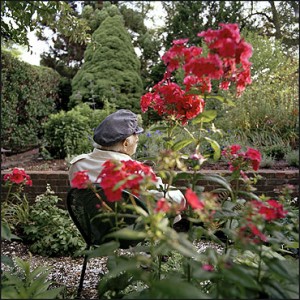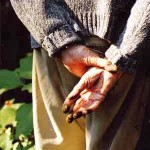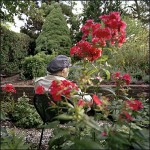 The poet Stanley Kunitz (1905 – 2006) summered in Provincetown for nearly 50 years where, over the decades, he built an extensive and apparently magnificent garden. His first collection of poems was published in 1930 and he continued to write through his very long and productive life. He was a beloved teacher and, as a judge of the Yale Younger Writers series, influenced the careers of many of our finest poets. He was a founder of the Fine Arts Work Center in Provincetown and Poets House in New York which, in its beautiful new quarters in Battery Park City, is a wonderful resource for poets and anyone who cares about the art form.
The poet Stanley Kunitz (1905 – 2006) summered in Provincetown for nearly 50 years where, over the decades, he built an extensive and apparently magnificent garden. His first collection of poems was published in 1930 and he continued to write through his very long and productive life. He was a beloved teacher and, as a judge of the Yale Younger Writers series, influenced the careers of many of our finest poets. He was a founder of the Fine Arts Work Center in Provincetown and Poets House in New York which, in its beautiful new quarters in Battery Park City, is a wonderful resource for poets and anyone who cares about the art form.
I got to know him through my friend Carol Houck Smith who was an editor at W. W. Norton for many years and who inherited him as an author when she was in her mid-70s and Kunitz was in his early 90s. She edited his last three books, including Passing Through which won the National Book Award in 1995. He became the tenth Poet Laureate of the United States in the autumn of 2000 when he was ninety-five years old.
Kunitz became frail after the publication of Passing Through and told Carol that, though he might not be able to write more poems, he would like to write a meditation on  poetry and his garden. The resulting book is entitled “The Wild Braid,” written in his one hundredth year and based on a series of interviews with Kunitz about his Provincetown garden, life, poetry, and the kindred spirit of all living things.
poetry and his garden. The resulting book is entitled “The Wild Braid,” written in his one hundredth year and based on a series of interviews with Kunitz about his Provincetown garden, life, poetry, and the kindred spirit of all living things.
Here’s what Kunitz has to say in the book about writing the poem ‘Snakes of September’ below. “There are forms of communication beyond language that have to do not only with the body, but with the spirit itself, a permeation of one’s being. I strongly identify with Henry James when he wrote, in answer to a letter about what compelled him to write, ‘The port from which I set out was, I think, that of the essential loneliness of my life….’ One of the great satisfactions of the human spirit is to feel that one’s family extends across the borders of species and belongs to everything that lives.”
The Snakes of September All summer I heard them rustling in the shrubbery, outracing me from tier to tier in my garden, a whisper among the viburnums, a signal flashed from the hedgerow, a shadow pulsing in the barberry thicket. Now that the nights are chill and the annuals spent, I should have thought them gone, in a torpor of blood slipped to the nether world before the sickle frost. Not so. In the deceptive balm of noon, as if defiant of the curse that spoiled another garden, these two appear on show through a narrow slit in the dense green brocade of a north-country spruce, dangling head-down, entwined in a brazen love-knot. I put out my hand and stroke the fine, dry grit of their skins. After all, we are partners in this land, co-signers of a covenant. At my touch the wild braid of creation trembles. Photos by Marnie Crawford Samuelson






Dear Liza,
What a pleasure it must have been for you to know him.
And what a beautiful poem. Thank you
Beata
And I love that after winning the National Book Award at the age of 90 or so, he signed a two-book contract with Norton! His later poems are like late Beethoven; there’s something otherworldly but also entirely human about them.
Thank you, Liza. I love the poem as well as Kunitz’s quote regarding communication between species. Lorraine
It’s a wonderful book, Lorraine. I read it at least once a year and always find something new in it!
Liza:
Stanley Kunitz was just a name of some American poet when I was first
introduced to him many moons ago at a women’s school in Kobe, Japan.
However, his name stuck with me all these decades because his simple yet
powerful words had penetrated my soul and left me shaken…
Seeing his name mentioned and reintroduced in your blog, it was as if I
stumbled on a dear old friend after infinite period of absence. And for that
I thank you.
Welcome back from France! Junko
Junko: I wonder which poems you first read as a girl by Kunitz in Japan — and were they translated? I’m so pleased I was able to “reintroduce” the two of you. His wife was a wonderful artist, by the way. I know you would like her work. Bon your! Liza
His poem I first read was: I dreamed That I Was Old…
And I understood him then.
Around 1976 you gave me “The Testing Tree” by S.K. off your shelf I believe.
…
Or practice to endure the heart unstrung,
The waiting at the door too long,
Winter, wages, and self-disdain.
I don’t remember that — but I’m glad my younger self appreciated Kunitz, too!
I cannot tell a lie: I am not a “poet-person” but the attached poem is so lovely , I am sending it off to a friend who is recovering from major surgery…I think his partner will enjoy it too.
Thank you,
Annette
I believe you must be a poet person at heart, Annette, if you thought a friend might benefit from this.